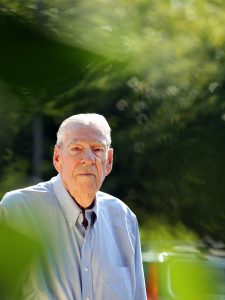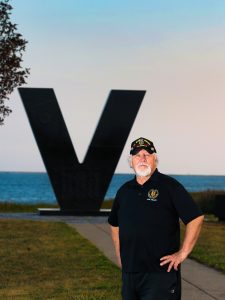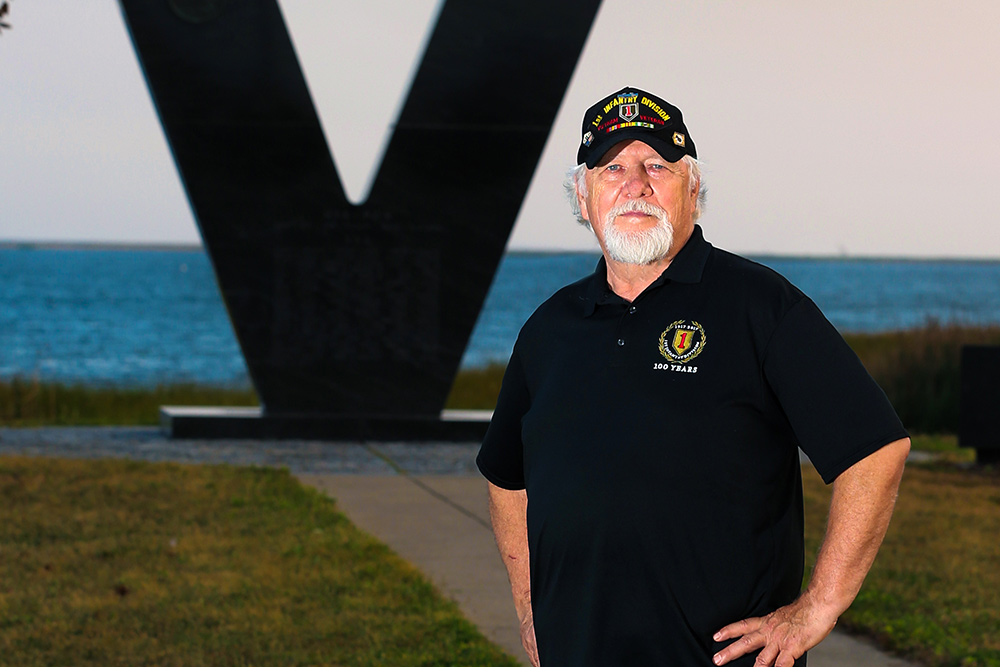We pass them on the street, stand behind them in line, live our lives side by side, unaware of the debt we owe them as they pass us by.
They fought in our stead in places like Normandy, Inchon, Loc Ninh, Al Anbar, and Helmand Province. Between the ages of 17 and 39, they put their comfortable lives and plans aside to risk everything in the mud and snow, heat and cold, the sand and the dirt of battlefields.
No matter how each of us may feel about any particular conflict, it is the veterans who shouldered the burdens, endured the losses, and carry the personal memories of our wars. The veterans acknowledged on these pages each have a connection to New Haven, and a connection to every other veteran across the country.
In acknowledging these five, we appreciate them all.
Lance Corporal Biancesca Rivera
 Like most 17-year-olds, Biancesca Rivera started her senior year at West Haven High School thinking about her future. Then she did something about it.
Like most 17-year-olds, Biancesca Rivera started her senior year at West Haven High School thinking about her future. Then she did something about it.
In September of 2009, Rivera enlisted in the Marines as a reservist. She recalls that after talking with a recruiter, she thought: “I finally have a plan for after high school.”
“I always wanted to serve, but I didn’t know exactly what I wanted to do,” says Rivera, whose long-term plan was college but who needed help with tuition. “When my recruiter started talking to me about the Marines, I was like, ‘Oh yes, I want to do this because it’s the toughest. If I’m going to go in, I might as well go all the way.’”
A month after graduation, in July 2010, Rivera left for boot camp at Parris Island, S.C., followed by combat training. Then it was off to diesel mechanic school for five months.
Shortly afterward, she got a call. She was needed in Afghanistan. She said, “Sure, I’ll go,” and was assigned to the 2nd Marine Logistics Group serving at Camp Leatherneck in Helmand Province, Afghanistan from September 2011 to April 2012. There, she was in charge of ordering, receiving, and distributing gear and repair parts to keep the diesel trucks running at the camp.
While deployed as a lance corporal, she became a U.S. citizen (she’d emigrated here from Peru with her family a decade earlier) at a naturalization ceremony at Kandahar Airfield in February 2012.
“I was excited when I learned I could get my citizenship overseas and surprised to see how many service members were there at the same time, getting naturalized during a combat deployment,” she remembers.
After her return, Rivera attended Southern Connecticut State University and graduated in 2016 with a bachelor’s degree in Spanish. She was deployed again to Albany, Georgia from July 2017 to July 2018 to assist with restoration of a Marine Corps logistics base after tornados devastated the area. Not one to waste time, she went to Boston University that September to get her master’s degree in secondary education and teaching.
Rivera is still in the Marine Reserves, lives in West Haven, and is vice commander at American Legion New Haven Post 210 and Jr. Vice Commander at Veterans of Foreign Wars New Haven Post 12150.
“Veterans Day is very special, and I try to spend it with other veterans,” she says. “I try to stay active within the veteran community. I appreciate veterans. I think I had it easy; I’ve seen what other veterans have had to deal with. The Marines show you how to be proud of who you are and the things that you do.”
U.S. Army Ranger Celestino Cordova
When Celestino Cordova was drafted in 1951, he’d spent most of his life on a farm in sunny Puerto Rico. Within months, he was an Army Ranger fighting in the unforgiving, frigid mountains of North Korea.
“We wore three pairs of gloves, two pairs of shoes, and a big parka,” Cordova says, gesturing to show how the front of the hood would cover their faces. He recalls one trip when his team was stuck on a mountainside there for three days and it “would hit 30 degrees below zero.”
Cordova’s unit of elite Rangers was fighting with the 65th Infantry Regiment. Nicknamed the “Borinqueneers,” for the original Taíno Indian name for Puerto Rico (Borinquen), the unit was made up entirely of soldiers from Puerto Rico. The unit scouted ahead of the infantry, often going deep into North Korea, finding enemy positions, removing mines and radioing back vital information. Cordova was a radioman and carried an M-1 Carbine and a sidearm.
Their missions were most dangerous when they were returning, usually before dawn, Cordova recalls. The enemy would have their own patrols out probing the U.S. lines so there was a danger of running into them, or of being mistaken for the enemy by their own troops as they approached home. Passwords were vital, as anxious lookouts would shoot at anything coming toward them in the dark.
Once this team was caught between the U.S. and North Korean forces when an operation began, and they were stuck in the middle being shelled from both sides. “I was never so scared in my life,” he says.
Throughout the Korean War, June 1950 to July 1953, the Ranger casualty rate was extremely high as they were the ones who went into the fray first. The tour for Rangers then was only nine months, “because they didn’t expect you to live,” Cordova recalls.
Cordova chose the Rangers, in part, based on the gear. Weighing about 135 pounds at the time, and having had a taste of heavy, full Army gear during basic training, he liked the idea of the Rangers because they travelled light. Luckily, he survived his nine months on the frontline, although many of his fellow Rangers did not. He remembers the day he boarded the bus to return to Seoul, “Ohhhhh….I was so happy!” he says.
After a brief visit home to see his family, he was assigned to Fort Riley, Kansas where he was the only Puerto Rican and only Spanish-speaker on the base.
“I went to the PX and bought a (Spanish-English) dictionary,” he says, “and memorized the words I needed to know like ‘attention’ and ‘fall-in’ and ‘fall-out.’”
Cordova thought he’d be peeling potatos for the next year, but the Colonel tapped him to be his personal driver, because — Cordova laughs and slaps the table with his hand — “he wanted to learn some Spanish!!”
He would finish his army career training soldiers in post-war Korea in 1953, and then would bring his new wife Leonides, whom he’d known since high school in Puerto Rico, to Fort Sill in Oklahoma. He left the Army in 1958.
The couple, by then with two children in tow, chose to move to New Haven because he heard there was work there. To make ends meet, Cordova drove taxis, worked as a painter and even cut hair. Eventually, the couple would have six children, and the family built a life for themselves in New Haven becoming well-known members of the community.
Cordova founded the Spanish Cultural Association, served as the first elected city-wide selectman of New Haven, and became a member of the Knights of Columbus, JUNTA for Progressive Action, the Democratic Hispanic Caucus, the Peace Commission, the Urban Renewal Initiative, LULAC Headstart, and the Democratic Town Committee.
On June 7, 2010, U.S. Representative Rosa L. DeLauro, D-New Haven, recognized Celestino Cordova for his service to the nation, presenting him with four over-due medals and two badges: the Korean Service Medal, the Army Good Conduct Medal, the National Defense Service Medal, the United Nations Korean Service Medal, the Combat Infantry Badge, and the Sharp Shooter Badge and Rifle Bar.
In June of 2014, Cordova received the Congressional Gold Medal from President Obama in Washington, D.C. in honor of the service of the Borinqueneers.
Cordova still lives in New Haven and at 91, remains an active and proud man.
It’s been quite a journey for a farm boy from Yabucoa, Puerto Rico.
Staff Sergeant Charles M. Pickett
In 2006, the military raised the maximum enlistment age to 42, which gave Charles M. Pickett “the opportunity to serve my country just like my grandfather and father had done.”
“I was older than everyone … all the time,” says Pickett, who enlisted at 39. “Basically, I joined the Army to serve my country during a time of war. I lived in Boston when the twin towers fell. Years later I remember thinking, ‘What have I done to help win these wars?’”
So, Pickett interrupted his life – he’d been working as a journalist, editor and writer – to join up. “While it was hard, it was one of the best things I have ever done,” he says, and it continued a family tradition.
His grandfather, 2nd Lt. John F. Pickett, Sr., served in American General Headquarters in France in World War I, and his father, Lt. John F. Pickett, Jr. served in the U.S. Navy Judge Advocate General Corps in the Pentagon during the Korean conflict.
Charles M. Pickett’s military career nearly ended soon after it started. In March 2007, during basic training at Fort Leonard Wood, Missouri, he “totally tore my ACL out of my right knee during the bayonet course.”
While recovering, and fearing he’d be medically discharged, Pickett convinced the physical therapy department to allow him back into Initial Entry Training (IET). He recalls, “To be honest, I really had fun in basic the second time around. By then, I was used to drill sergeants yelling all the time.”
Three months after he finished, Pickett was in Iraq, where he was part of Operation Iraqi Freedom with the 814th Multi-Role Bridge Company. He was deployed from November 2007 to August 2008.
The engineer company conducted dozens of bridge missions in central Iraq, including the Baghdadi Bridge on the Euphrates River near Al Asad Airbase, over the Ramadi Canal, and outside combat outpost COP Carver in Salman Pak over the Tigris River, southeast of Baghdad.
From August 2010 to August 2011, Pickett was part of Operation Enduring Freedom doing the same kind of work – assembling and maintaining military and float bridges, rafts, and long-term, lines-of-communication bridges.
“Veterans Day is for everyone who served our country in the military,” he says. “It doesn’t matter if you served in wartime or peacetime, if you deployed or were stateside. If you served, this special day is your day. Veterans Day is a celebration of life, a recognition of shared service and sacrifice for a country we love, and an annual day to bond with our military family – our brothers and sisters in arms.”
After serving five years in the U.S. Army, he moved to New Haven to attend Southern Connecticut State University on the Post-9/11 GI Bill in August 2012. He started teaching English at The Sound School in August 2015.
He is commander of the VFW New Haven Post 12150, the American Legion New Haven Post 210, and VFW Department of Connecticut District Two, and serves on the New Haven Mayor’s Veterans Affairs Advisory Committee. He is still missing his ACL.
 Second Lieutenant Robert C. Hart
Second Lieutenant Robert C. Hart
The enthusiasm Robert C. Hart had for flying is matched only by the enthusiasm he has for life.
He flew 1,500 missions in the skies of Britain, France, and Germany during World War II, including his very first – on D-Day June 6, 1943.
Watching tracers from enemy ground fire rising through the clear night towards his C-47, Hart towed a glider carrying paratroopers over the Normandy coast and inland during Operation Overlord, codename for the invasion of France that would eventually lead to the defeat of the Nazis in May 1945.
The glider detached to land in a field behind the front lines, and the paratroopers moved forward on foot to confront the Germans dug in near Saint-Lô.
Hart returned to his air base in England, to fly ammunition, food, even fuel for Patton’s tanks throughout the rest of the war. On his return trips, he would often transport the wounded back to England.
At war’s end, he flew a major to Germany. “On the trip back, they loaded my plane with French prisoners of war who had just been released and I flew them back to Paris. When we got there, a band was playing and all these guys piled out, and I just went down to the end of the runway and took off back to England.”
During the war, he would sometimes get a pass to leave the base and was drawn to London. While in Hyde Park, a young woman reading on a park bench caught his eye. Her name was Marie and she was working as a translator after escaping Spain and the fascist regime of General Francisco Franco. He says, “She was beautiful.”
Hart returned home from the war in August of 1945, but in 1946 went back to England for Marie. They were married by a justice of the peace, and together returned again to America by ship. She would be his wife for 57 years until she passed in 2004. They would have one son.
Hart resumed his interrupted academic career at UConn and graduated with a degree in engineering in 1948. He designed machinery for the Pond’s Extract Company in Madison, and later worked as an engineer for the R. Donnelley & Sons printing company in Old Saybrook. He then became a land surveyor, self-employed until he was in his early 90s. Just after the war, he’d applied to the airlines to be a pilot, but he remembers, “They said, ‘Don’t call us, we’ll call you!’” After the war, there were a lot of pilots who still wanted to fly.
“I loved flying … just loved it. I enjoyed the war. Not many people can say that, because I was doing what I wanted to do. In fact, if somebody didn’t want to go one night, I’d raise my hand and say, ‘I’ll go!’”
Hart was born New Haven in 1921 and moved to Madison at the age of 10. It was in Madison that he first took to the skies as a child, taking a ride in a biplane out of Griswold Field. It cost a dollar. Now 98, he lives alone in North Branford and drives, shops, cooks, meets the guys for lunch, reads, and plays pool.

Sergeant Victor Binkoski
Victor Binkoski was a freshman at Boston University, on a football scholarship, when a close friend was killed in the Vietnam War. That’s when he made the decision to enlist.
“I couldn’t understand why I was home, going to college, and other people were dying in the war,” he says.
It was a decision that wasn’t particularly popular with many of his family or friends.
Not long after Thanksgiving 1967, he found himself in Loc Ninh, 75 miles north of Saigon near the Cambodian border, with the 1st Infantry Division (“The Big Red One”), 1st Battalion, 2nd Regiment. In his year of service there, which began Dec. 5, 1967, he would earn two Purple Hearts, the Bronze Star, and the Air Medal for 50 helicopter combat assaults.
Binkoski was also awarded the Distinguished Service Cross (second only to the Medal of Honor) for heroic action on Sept. 11, 1968 when, under heavy rocket-propelled grenade and automatic weapons fire, he carried a wounded machine gunner to safety, and upon returning to his platoon, found the platoon leader had been killed and the platoon sergeant seriously wounded. He regrouped the platoon and led a four-man team to rescue other casualties who were lying exposed to enemy fire. Using himself as a decoy, he allowed the other men to rescue two injured soldiers. After providing covering fire for the rescue, he returned to the rest of the platoon and led an assault on the North Vietnamese position, forcing them to retreat, and capturing a recoilless rifle that is now on display at Fort Riley, Kansas.
Upon returning home after his tour at the age of 20, he finished his service as a drill sergeant E-6, and was awarded the Outstanding Drill Sergeant Trainer Award at Fort Jackson, S.C.
After his discharge, he married his junior high school sweetheart, Donna Sweeney, who had sent him a letter a day throughout his 365 days serving in Vietnam.
They raised three children, while Binkoski worked as director of labor relations in New Haven, as director of personnel and civil service in Hamden, and as director of personnel at SCSU. Now retired, he lives in Bethany, volunteers at a soup kitchen, and helps fellow veterans who need rides or other assistance.
Some of his memories are painful – he lost a few comrades in Vietnam – but he says, “I would never give up one minute of the time I spent in the service. I would do the same thing again. On Veterans Day, we celebrate all those people who have served to protect our freedoms and the freedoms of people all over the world.”
Looking towards the Vietnam Veterans Memorial he helped to create, he says, “I spend Veterans Day here. I get here at dawn, say a prayer, and talk to my guys.”
Written and photographed by Stan Godlewski







More Stories
Over 50, Underestimated: The Grandfluencers Redefining Age on Social Media
Building Resilient Businesses: Strategies for Success
Summer Means Convertibles